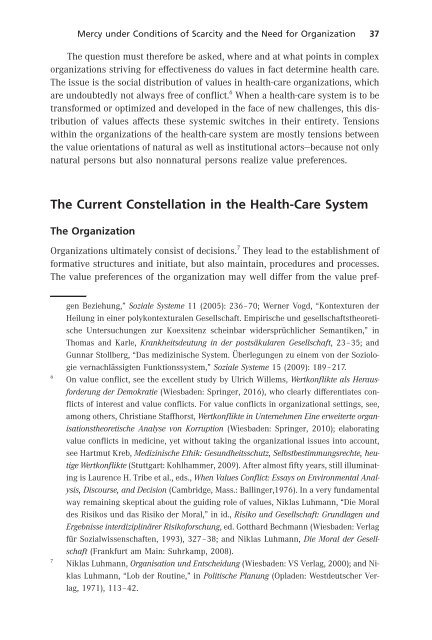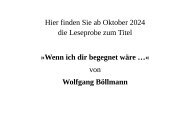Michael Welker | Eva Winkler | John Witte, Jr. | Stephen Pickard (Eds.): The Impact of Health Care (Leseprobe)
Pluralism has become the defining characteristic of many modern societies. Not only a plurality of individual and social claims and activities gain impacts on societal life. A creative pluralism of institutions and their norms profoundly shape our moral commitments and character – notably the family, the market, the media, and systems of law, religion, politics, research, education, health care, and defense. In the theoretical, empirical, and historical contributions to this volume, specialists on medicine, medical ethics, psychology, theology and health care discuss the many challenges that major transformations in their areas of expertise pose to the communication and orientation in late modern pluralistic societies. Contributors come from Germany, the USA and Australia.
Pluralism has become the defining characteristic of many modern societies. Not only a plurality of individual and social claims and activities gain impacts on societal life. A creative pluralism of institutions and their norms profoundly shape our moral commitments and character – notably the family, the market, the media, and systems of law, religion, politics, research, education, health care, and defense.
In the theoretical, empirical, and historical contributions to this volume, specialists on medicine, medical ethics, psychology, theology and health care discuss the many challenges that major transformations in their areas of expertise pose to the communication and orientation in late modern pluralistic societies. Contributors come from Germany, the USA and Australia.
Create successful ePaper yourself
Turn your PDF publications into a flip-book with our unique Google optimized e-Paper software.
Mercy under Conditions <strong>of</strong> Scarcity and the Need for Organization 37<br />
<strong>The</strong> question must therefore be asked, where and at what points in complex<br />
organizations striving for effectiveness do values in fact determine health care.<br />
<strong>The</strong> issue is the social distribution <strong>of</strong> values in health-care organizations, which<br />
are undoubtedly not always free <strong>of</strong> conflict. 6 When ahealth-care system is to be<br />
transformed oroptimized and developed inthe face <strong>of</strong> new challenges, this distribution<br />
<strong>of</strong> values affects these systemic switches in their entirety. Tensions<br />
within the organizations <strong>of</strong> the health-care system are mostly tensions between<br />
the value orientations <strong>of</strong> natural as well as institutional actors—because not only<br />
natural persons but also nonnatural persons realize value preferences.<br />
<strong>The</strong> Current Constellation in the <strong>Health</strong>-<strong>Care</strong> System<br />
<strong>The</strong> Organization<br />
6<br />
7<br />
Organizations ultimately consist <strong>of</strong> decisions. 7 <strong>The</strong>y lead to the establishment <strong>of</strong><br />
formative structures and initiate, but also maintain, procedures and processes.<br />
<strong>The</strong> value preferences <strong>of</strong> the organization may well differ from the value prefgen<br />
Beziehung,” Soziale Systeme 11 (2005): 236–70; Werner Vogd, “Kontexturen der<br />
Heilung in einer polykontexturalen Gesellschaft. Empirische und gesellschaftstheoretische<br />
Untersuchungen zur Koexsitenz scheinbar widersprüchlicher Semantiken,” in<br />
Thomas and Karle, Krankheitsdeutung in der postsäkularen Gesellschaft, 23–35; and<br />
Gunnar Stollberg, “Das medizinische System. Überlegungen zu einem von der Soziologie<br />
vernachlässigten Funktionssystem,” Soziale Systeme 15 (2009): 189–217.<br />
On value conflict, see the excellent study by Ulrich Willems, Wertkonflikte als Herausforderung<br />
der Demokratie (Wiesbaden: Springer, 2016), who clearly differentiates conflicts<br />
<strong>of</strong> interest and value conflicts. For value conflicts in organizational settings, see,<br />
among others, Christiane Staffhorst, Wertkonflikte in Unternehmen Eine erweiterte organisationstheoretische<br />
Analyse von Korruption (Wiesbaden: Springer, 2010); elaborating<br />
value conflicts in medicine, yet without taking the organizational issues into account,<br />
see Hartmut Kreb, Medizinische Ethik: Gesundheitsschutz, Selbstbestimmungsrechte, heutige<br />
Wertkonflikte (Stuttgart: Kohlhammer, 2009). After almost fiftyyears, still illuminating<br />
is Laurence H. Tribe et al., eds., When Values Conflict: Essays on Environmental Analysis,<br />
Discourse, and Decision (Cambridge, Mass.: Ballinger,1976). In avery fundamental<br />
way remaining skeptical about the guiding role <strong>of</strong> values, Niklas Luhmann, “Die Moral<br />
des Risikos und das Risiko der Moral,” in id., Risiko und Gesellschaft: Grundlagen und<br />
Ergebnisse interdiziplinärer Risik<strong>of</strong>orschung,ed. Gotthard Bechmann (Wiesbaden: Verlag<br />
für Sozialwissenschaften, 1993), 327–38; and Niklas Luhmann, Die Moral der Gesellschaft<br />
(Frankfurt am Main: Suhrkamp, 2008).<br />
Niklas Luhmann, Organisation und Entscheidung (Wiesbaden: VS Verlag, 2000); and Niklas<br />
Luhmann, “Lob der Routine,” in Politische Planung (Opladen: Westdeutscher Verlag,<br />
1971), 113–42.
















